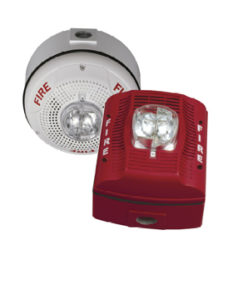Fire alarm systems are designed to protect life and property, but these systems will be useless if not maintained, tested and repaired with regular inspections by licensed fire alarm technicians. Fire detection devices, control panels and networks consist of precision components that must work together to provide reliable protection when needed. Standards recommended by the National Fire Protection Association, NFPA, call for visual inspections biannually with annual testing of all functional components in addition to testing the sensitivity of smoke and gas detectors.
Fire Alarm Inspection Proven to Improve Reliability
Routine fire alarm inspections are proven to improve the reliability of these vital safety systems and prevent catastrophic disasters including loss of life and property. Inspections must follow a set of standards, be detailed, thorough and performed by licensed technicians. Thorough fire alarm inspections should include:
Records – Records of the age and type of system installed, modifications and repair history are all important records for fire alarm technicians, so they are fully aware of all equipment, manufacturer recommendations and connectivity issues between components.
Inspection – Fire alarm technicians are fully trained in what to look for and how to visually and manually inspect all components for reliable performance. Smart fire alarm systems available today perform self-monitoring activities to alert technicians of specific failures in circuit boards, control panels or detection equipment. When inspections or self-monitoring activities reveal any failures including ground faults, it is vital that a licensed technician perform a thorough inspection to reveal and repair any component that would cause a system failure.
Testing – Fire alarm inspections must include testing of all systems that integrate with the alarm system such as fire suppression equipment, sprinkler systems, HVAC systems, fire door control, elevator recall, network notifications and visual and audible evacuation alerts.
Maintenance – Routine maintenance reduces instances of faulty components and system failure. Licensed fire alarm technicians perform routine maintenance during testing and inspections which may include cleaning accumulated dust from components and replacing any worn out components.
Repair – When repair is required, fire alarm technicians perform the recommended repairs according to equipment manufacturer recommendations with UL approved components and knowledge of proper repair and installation techniques. Licensed technicians ensure total code compliance to all local and federal regulations.
Routine fire alarm inspections, testing, maintenance and repair are vital to these systems providing the life-saving functions they are designed for. The reliability of your fire alarm system depends upon several factors including the quality of your system and components, the proper design for your building structure and property, proper installation techniques and maintaining regular, routine fire alarm inspections from licensed technicians.
HRSS/SMG is a leading fire and safety specialist with experience in system design, inspection, testing, maintenance and repairs. We offer skilled fire system designers with vast expertise in all code regulations and are distributors of UL listed equipment from the best names in fire alarm manufacturers. Contact us today to learn more about our comprehensive services including licensed fire alarm system inspections.



